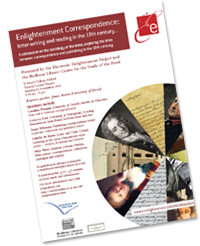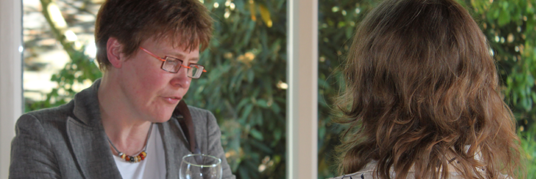* You are viewing Posts Tagged ‘Book History’
Elsevier, a world-leading provider of scientific, technical, and medical information products and services, and the Scaliger Institute of Leiden University Libraries have announced the founding of a three-year fellowship program to enable international rare books scholars to study century scientific scholarship and publishing in the early modern period. The program will support two scholars to work with the extensive Leiden University Special Collections and the Elsevier Heritage Collection – recently catalogued online – for a period of one to three months annually. They will also be invited to share their research through public lectures and publications. The closing date for applications is 1 March 2012. For further information and the application form please visit the websites of Elsevier or the Scaliger Institute. Please address queries to scaliger@library(at)leidenuniv.nl.
 The second annual Anglo-French Conference on Scientific Communication and its History will take place in Paris at the Ecole Normale Supérieure on 9–10 March 2012. The conference will explore how technological developments – from the invention of printing with movable type to the postal network, from the railway timetable to the electric telegraph, from the telephone to e-mail – have profoundly influenced the nature of scientific communication and the structure and practice of science. It will bring together scientists, historians, social scientists, and science communicators to explore the role of technologies, both physical and social, in the history and present practice of communication within and around scientific communities and between science and its various publics. The conference will be organised around four themes: print and text; correspondence; networks and gatherings; and non-print media. In each of these it will explore the interaction between technical change and communicative practice by considering examples taken from across a wide range of historical conjunctures and disciplines. Papers should be thirty minutes in length, and should fall within one of the four themes. Doctoral students are invited to give fifteen-minute papers. The deadline for 300-word proposals is 15 January 2012. For further details and submission instructions, please download the conference flyer (pdf).
The second annual Anglo-French Conference on Scientific Communication and its History will take place in Paris at the Ecole Normale Supérieure on 9–10 March 2012. The conference will explore how technological developments – from the invention of printing with movable type to the postal network, from the railway timetable to the electric telegraph, from the telephone to e-mail – have profoundly influenced the nature of scientific communication and the structure and practice of science. It will bring together scientists, historians, social scientists, and science communicators to explore the role of technologies, both physical and social, in the history and present practice of communication within and around scientific communities and between science and its various publics. The conference will be organised around four themes: print and text; correspondence; networks and gatherings; and non-print media. In each of these it will explore the interaction between technical change and communicative practice by considering examples taken from across a wide range of historical conjunctures and disciplines. Papers should be thirty minutes in length, and should fall within one of the four themes. Doctoral students are invited to give fifteen-minute papers. The deadline for 300-word proposals is 15 January 2012. For further details and submission instructions, please download the conference flyer (pdf).
 The Edward Worth Library, Dublin, is offering a single one-month fellowship to be held in 2011, to encourage research relevant to its collections. The Worth Library is a collection of 4,500 books, left to Dr Steevens’ Hospital by Edward Worth (1678-1733), an early eighteenth-century Dublin physician. The collection is particularly strong in three areas: early modern medicine, early modern history of science and, given that Worth was a connoisseur book collector interested in fine bindings and rare printing, the History of the Book. Research does not, however, have to be restricted to these three key areas. Further information about the collection and our catalogues may be found on the library’s website. The closing date for applications is 14 April 2011. For further details and application procedures please contact: Dr Elizabethanne Boran, Librarian, The Edward Worth Library, Dr Steevens’ Hospital, Dublin 8, Ireland (elizabethanne.boran[at]hse.ie). You can download the advertisement here (doc).
The Edward Worth Library, Dublin, is offering a single one-month fellowship to be held in 2011, to encourage research relevant to its collections. The Worth Library is a collection of 4,500 books, left to Dr Steevens’ Hospital by Edward Worth (1678-1733), an early eighteenth-century Dublin physician. The collection is particularly strong in three areas: early modern medicine, early modern history of science and, given that Worth was a connoisseur book collector interested in fine bindings and rare printing, the History of the Book. Research does not, however, have to be restricted to these three key areas. Further information about the collection and our catalogues may be found on the library’s website. The closing date for applications is 14 April 2011. For further details and application procedures please contact: Dr Elizabethanne Boran, Librarian, The Edward Worth Library, Dr Steevens’ Hospital, Dublin 8, Ireland (elizabethanne.boran[at]hse.ie). You can download the advertisement here (doc).
 The first Electronic Enlightenment colloquium on the sociology of the letter – Enlightenment Correspondence: Letter-Writing and Reading in the Eighteenth Century – will take place at St Anne’s College on Saturday 13 November 2010. Co-sponsored by the Bodleian Library’s Centre for the Study of the Book, the colloquium will provide a forum for academics and graduate students interested in both correspondence about publishing and the publication of correspondence itself in the Enlightenment period. The event includes papers by keynote speaker James Raven and other scholars from the UK and US on publishing and private correspondence, letters in lives and works, letters as primary sources, and letters as historical documents. For further information, including a list of speakers, paper titles, the programme schedule, and registration information, please visit the colloquium webpage.
The first Electronic Enlightenment colloquium on the sociology of the letter – Enlightenment Correspondence: Letter-Writing and Reading in the Eighteenth Century – will take place at St Anne’s College on Saturday 13 November 2010. Co-sponsored by the Bodleian Library’s Centre for the Study of the Book, the colloquium will provide a forum for academics and graduate students interested in both correspondence about publishing and the publication of correspondence itself in the Enlightenment period. The event includes papers by keynote speaker James Raven and other scholars from the UK and US on publishing and private correspondence, letters in lives and works, letters as primary sources, and letters as historical documents. For further information, including a list of speakers, paper titles, the programme schedule, and registration information, please visit the colloquium webpage.
James Brown
June 09, 2010
Events, Lectures, Project Updates
Tags: Amsterdam, Antoinette Bourignon, Book History, Communication, Gender, Jan Amos Comenius, Low Countries, Networks, Religion, Seventeenth Century, Women

Discussions continue with Professor de Baar during the wine reception.
In the sixth installment of the Project’s seminar series on Thursday 3 June, Professor Mirjam de Baar (University of Groningen) described the epistolary practice and strategies of a seventeenth-century female prophet and mystic in a paper entitled ‘The Re-construction of a Spiritual Network: The Correspondence of Antoinette Bourignon (1616-1680)’. From her base in Amsterdam (where she purchased her own press in the late 1660s), Bourignon used a variety of textual media to disseminate the message that she was a spiritual leader – ‘The Mother’ – chosen by God to restore true Christianity on earth, and to consolidate a following around this ecumenical identity. Bourignon’s letters, argued de Baar, were central to this programme; over 600 manuscript versions survive (both originals and scribal copies), eleven different printed editions appeared during her lifetime, while nine further volumes were subsequently published posthumously. Her correspondents included luminaries such as Jan Amos Comenius (1592-1670), Robert Boyle (1627-1691), Jan Swammerdam (1637-80), and Pierre Poiret (1646-1719), as well as a wide range of socially diverse disciples who wrote to her seeking advice on a variety of spiritual and personal issues, and whose preoccupations and voices are anonymously reproduced in published responses. In consequence, her letters have a dialogic, polyphonous quality, while the same followers who wrote to her seeking guidance in turn represented an important market for the letters in their printed manifestations, suggesting a close relationship between epistolarity and the mechanics of early modern publishing, and the existence of a shrewd business model beneath the spiritual discourse (a point further underlined during subsequent discussion). Despite her failure to establish a long-term community on the island of Nordstrand, and the fact that in the later years of her life the suspicions of Lutheran clergy forced her into exile in Eastern Friesland, Bourignon maintained a prolific output of letters, and continued to combine the roles of spiritual leader, publisher of epistolary collections, and manager of what might be interpreted as a spiritually driven commercial enterprise. Seminars take place in the Faculty of History on George Street on Thursdays at 3pm. For future seminars in the series, please see here.
 Podcast now available on the seminar page!
Podcast now available on the seminar page!

 The second annual Anglo-French Conference on Scientific Communication and its History will take place in Paris at the
The second annual Anglo-French Conference on Scientific Communication and its History will take place in Paris at the  The
The 


 Join
Join 